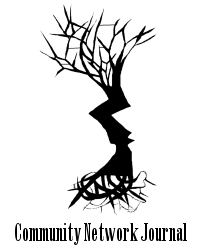By Oscar Wilde
October 16, 1854 – November 30, 1900
(Lived 46 Years)
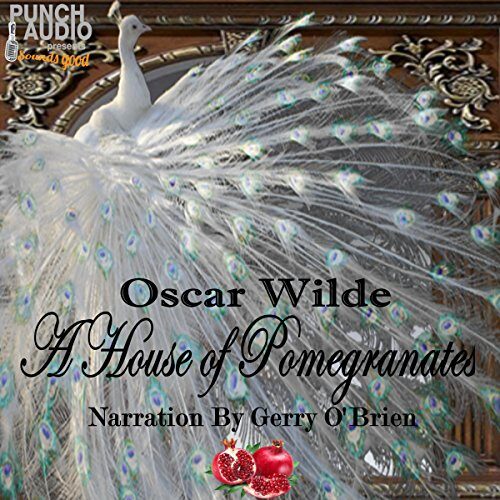
Formats Used: Audiobook + Online Text
https://www.gutenberg.org/files/873/873-h/873-h.htm
Summary
A series of fairy tales with beautiful sensory details and material descriptions. These stories involve opulance, struggles with acceptability and commentaries on class inequality.
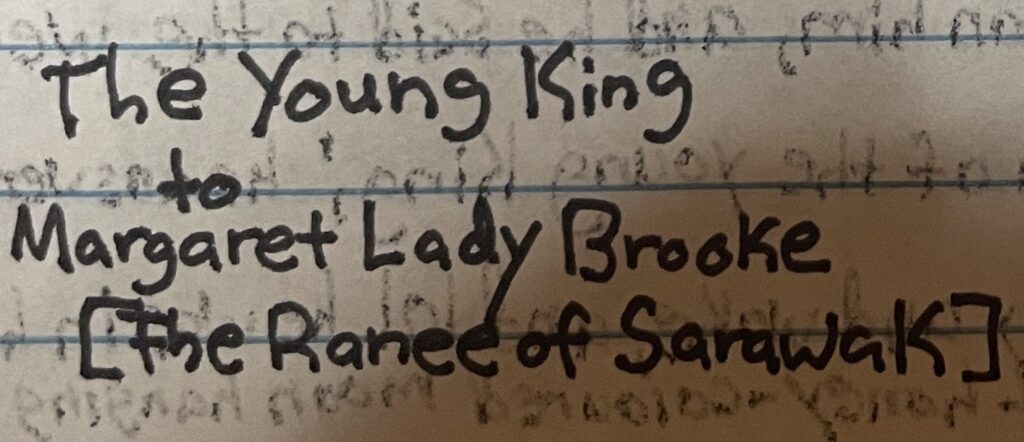
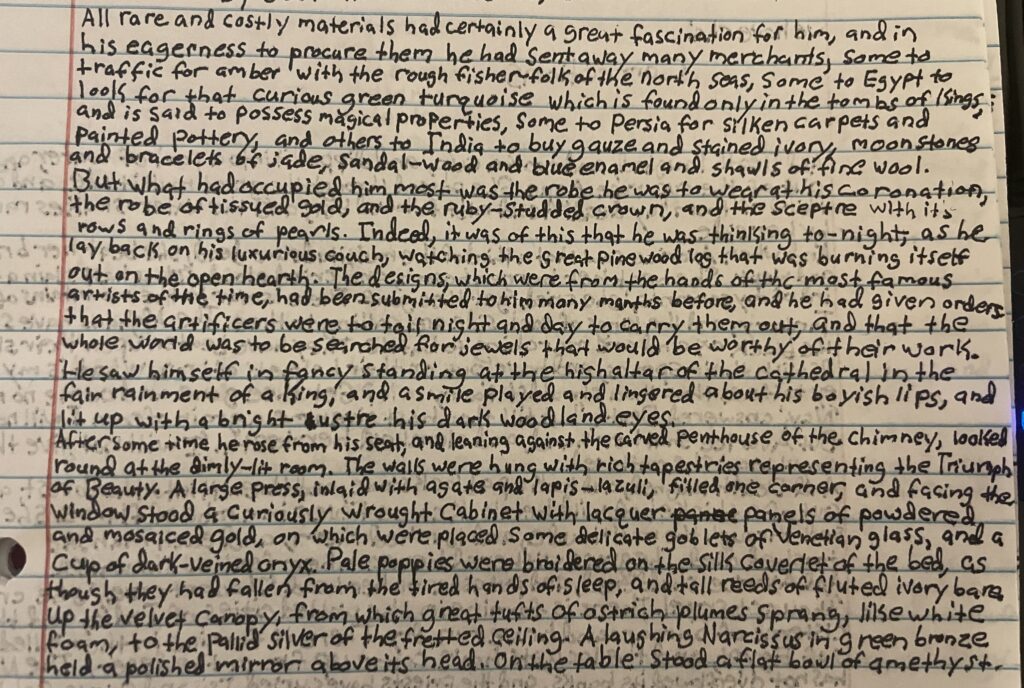
All rare and costly materials had certainly a great fascination for him, and in his eagerness to procure them he had sent away many merchants, some to traffic for amber with the rough fisher-folk of the north seas, some to Egypt to look for that curious green turquoise which is found only in the tombs of kings, and is said to possess magical properties, some to Persia for silken carpets and painted pottery, and others to India to buy gauze and stained ivory, moonstones and bracelets of jade, sandal-wood and blue enamel and shawls of fine wool. But what had occupied him most was the robe he was to wear at his coronation, the robe of tissued gold, and the ruby-studded crown, and the sceptre with its rows and rings of pearls. Indeed, it was of this that he was thinking to-night, as he lay back on his luxurious couch, watching the great pinewood log that was burning itself out on the open hearth: The designs, which were from the hands of the most famous artists of the time, had been submitted to him many months before and he had given orders that the artificers were to toil night and day to carry them out, and that the whole world was to be searched for jewels that would be worthy of their work. He saw himself in fancy standing at the high altar of the cathedral in the fair rainment of a king, and a smile played and lingered about his boyish lips, and lit up with a bright lustre his dark woodland eyes.
After some time he rose from his seat, and leaning against the carved penthouse of the chimney, looked round at the dimly-lit room. The walls were hung with rich tapestries representing the Triumph of Beauty. A large press, inlaid with agate and lapis-lazuli, filled one corner, and facing the window stood a curiously wrought cabinet with lacquer panels of powdered and mosaiced gold, on which were placed some delicate goblets of Venetian glass, and a cup of dark-beined onyx. Pale poppies were broidered on the silk coverlet of the bed, as though they had fallen from the tired hands of sleep, and tall reeds of fluted ivory bare up the velvet canopy, from which great tufts of ostrich plumes sprang, like white foam, to the pallid silver of the fretted ceiling. A laughing Narcissus in green bronze held a polished mirror above its head. On the table stood a flat bowl of amethyst.
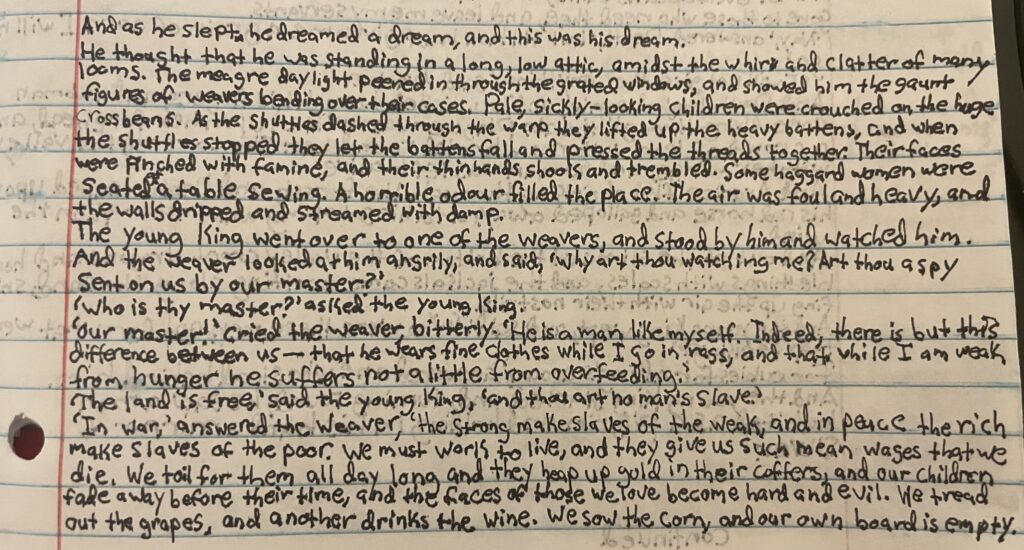
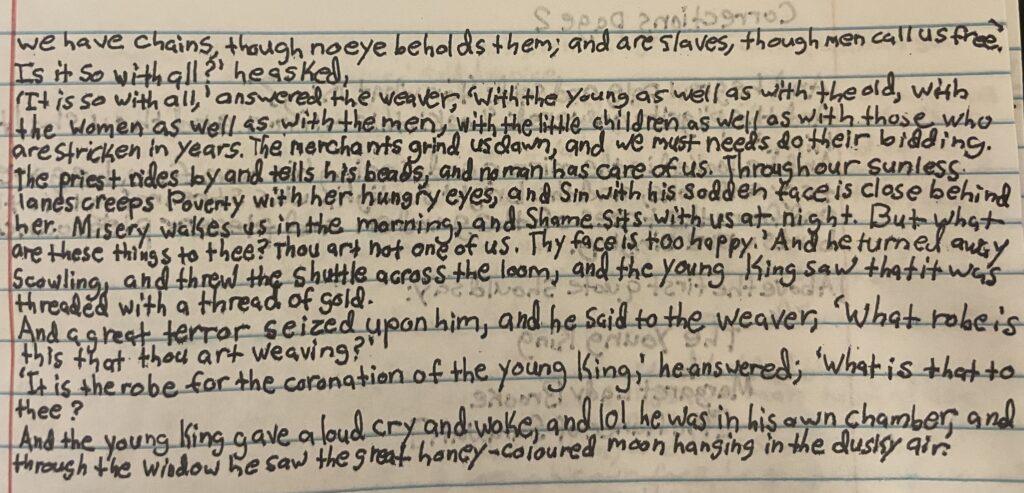
And as he slept he dreamed a dream, and this was his dream.
He thought that he was standing in a long, low attic, amidst the whirl and clatter of many looms. The meagre daylight peered in through the grated windows, and showed him the guant figures of weavers bending over their cases. Pale, sickly-looking children were crouched on the huge crossbeams. As the shuttles dashed through the warp they lifted up the heavy battens, and when the shuttles stopped they let the battens fall and pressed the threads together. Their faces were pinched with famine, and their thin hands shook and trembled. Some haggard women were seated at a table sewing. A horrible odour filled the place. The air was foul and heavy, and the walls dripped and streamed with damp.
The young King went over to one of the weavers, and stood by him and watched him.
And the weaver looked at him angrily, and said, ‘Why art thou watching me? Art thou a spy sent on us by our master?’
‘Who is thy master?’ asked the young King.
‘Our master!’ cried the weaver, bitterly. ‘He is a man like myself. Indeed, there is but this difference between us – that he wears fine clothes while I go in rags, and that while I am weak from hunger he suffers not a little from overfeeding.’
‘The land is free,’ said the young King, ‘and thou art no man’s slave.’
‘In war,’ answered the weaver, ‘the strong makes slaves of the weak, and in peace the rich make slaves of the poor. We must work to live, and they give us such mean wages that we die, we toil for them all day long and they heap up gold in their coffers, and our children fade away before their time, and the faces of those we love become hard and evil. We tread out the grapes, and another drinks the wine. We sow the corn, and our own board is empty. We have chains, though no eye behods them; and are slaves, though men call us free.’
‘Is it so with all?’ he asked,
‘It is so with all,’ answered the weaver, ‘with the young as well as with the old, with the women as well as with the men, with the little children as well as with those who are stricken in years. The merchants grind us down, and we must needs do their bidding. The priest rides by and tells his beads, and no man has care of us. Through our sunless lanes creeps Poverty with her hungry eyes, and Sin with his sodden face is close behind her. Misery wakes us in the morning, and Shame sits with us at night. But what are these things to thee? Thou art not one of us. Thy face is too happy.’ And he turned away scowling, and threw the shuttle across the loom, and the young King saw that it was threaded with a thread of gold.
And a great terror seized upon him, and he said to the weaver, ‘What robe is this that thou art weaving?’
‘It is the robe for the coronation of the young King,’ he answered; ‘What is that to thee?’
And the young King gave a loud cry and woke, and lo! he was in his own chamber, and through the window he saw the great honey-coloured moon hanging in the dusky air.

He thought that he was wandering through a dim wood, hung with strange fruits and with beautiful poisonous flowers. The adders hissed at him as he went by, and the bright parrots flew screaming from branch to branch. Huge tortoises lay asleep upon the hot mud. The trees were full of apes and peacocks.
On and on he went, till he reached the outskirts of the wood, and there he saw an immense multitude of men toiling the bed of a dried-up river. They swarmed up the crag like ants. They dug deep pits in the ground and went down into them. Some of them cleft the rocks with great axes; others grabbled in the sand.
They tore up the cactus by its roots, and trampled on the scarlet blossoms. They hurried about, calling to each other, and no man was idle.
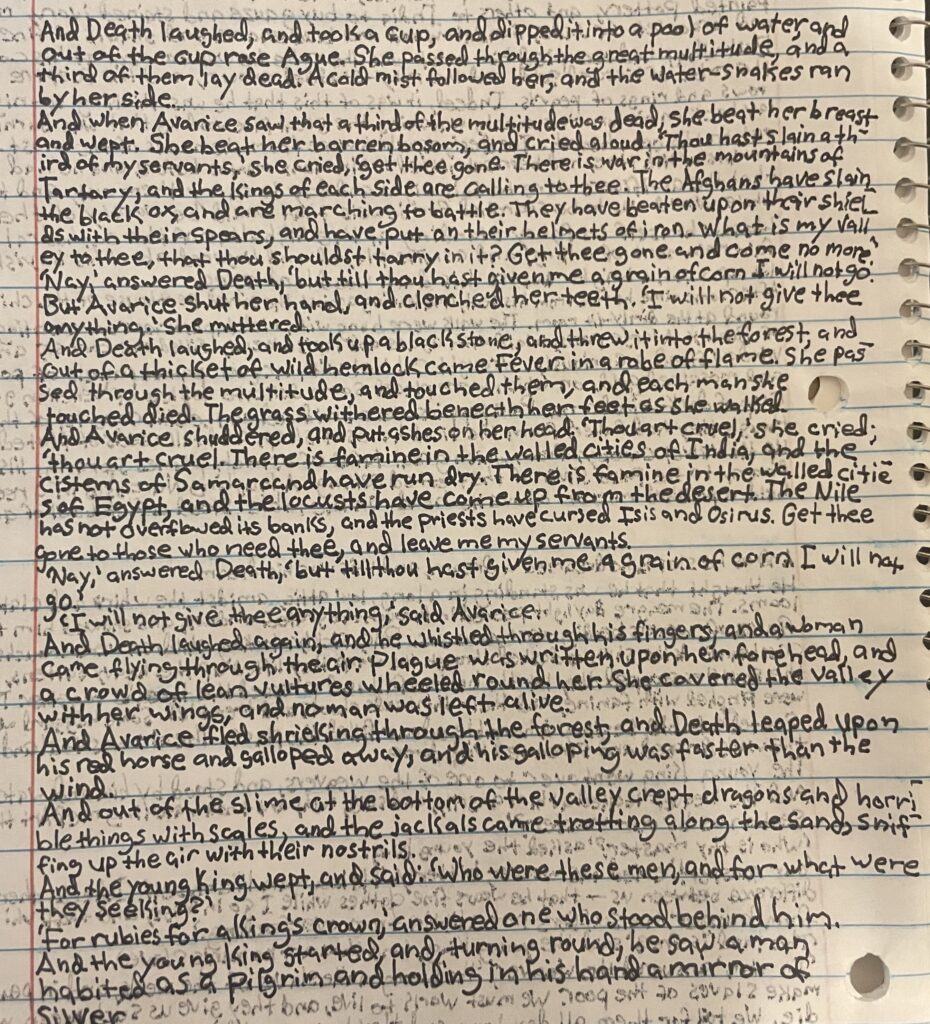

And Death laughed, and took a cup, and dipped it into a pool of water, and out of the cup rose Ague. She passed through the great multitude, and a third of them lay dead. A cold mist followered her, and the water-snakes ran by her side.
And when Avarice saw that a third of the multitude was dead, she beat her breast and wept. She beat her barren bosom, and cried aloud. ‘Thou hast slain a third of my servants,’ she cried, ‘get thee gone. There is war in the mountains of Tartary, and the kings of each side are calling to thee. The Afghans have slain the black ox, and are marching to battle. They have beaten upon their shields with their spears, and have put on their hemets of iron. What is my valley to thee, that thou shouldst tarry in it? Get thee gone and come no more.’
‘Nay,’ answered Death, ‘but till thou hast given me a grain of corn I will not go,’
But Avarice shut her hand, and clenched her teeth. ‘I will not give thee anything.’ she muttered.
And Death laughed, and took up a black stone, and threw it into the forest, and out of a thicket of wild hemlock came Fever in a robe of flame. She passed through the multitude, and touched them, and each man she touched died. The grass withered beneath her feet as she walked.
And Avarice shuddered, and put ashes on her head. ‘Thou art cruel,’ she cried; ‘thou art cruel. There is famine in the walled cities of India, and the cisterns of Samarcand have run dry. There is famine in the walled cities of Egypt, and the locusts have come up from the desert. The Nile has not overflowed its banks, and the Priests have cursed Isis and Osirus. Get thee gone to those who need thee, and leave me my servants.
‘Nay,’ answered Death, ‘but till thou hast given me a grain of corn I will not go.’
‘I will not give thee anything,’ said Avarice.
And Death laughed again, and he whistled through his fingers, and a woman came flying through the air. Plague was written upon her forehead, and a crowd of lean vultures wheeled round her. She covered the valley with her wings, and no man was left alive.
And Avarice fled shrieking through the forest, and Death leaped upon his red horse and galloped away, and his galloping was faster than the wind.
And out of the slime at the bottom of the valley crept dragons and horrible things with scales, and the jackals came trotting along the sand, sniffing up the air with their nostrils.
And the young King wept, and said: ‘Who were these men, and for what were they seeking?’
‘For rubies for a King’s crown,’ answered one who stood behind him.
And the young King started, and turning round, he saw a man habited as a pilgrim and holding in his hand a mirror of silver.
And he grew pale, and said: ‘For what King?’
And the pilgrim answered: ‘Look in this mirror, and thou shalt see him.’
And he looked in the mirror, and, seeing his own face, he gave a great cry and woke, and the bright sunlight was streaming into the room, and from the trees of the garden and pleasaunce the birds were singing.
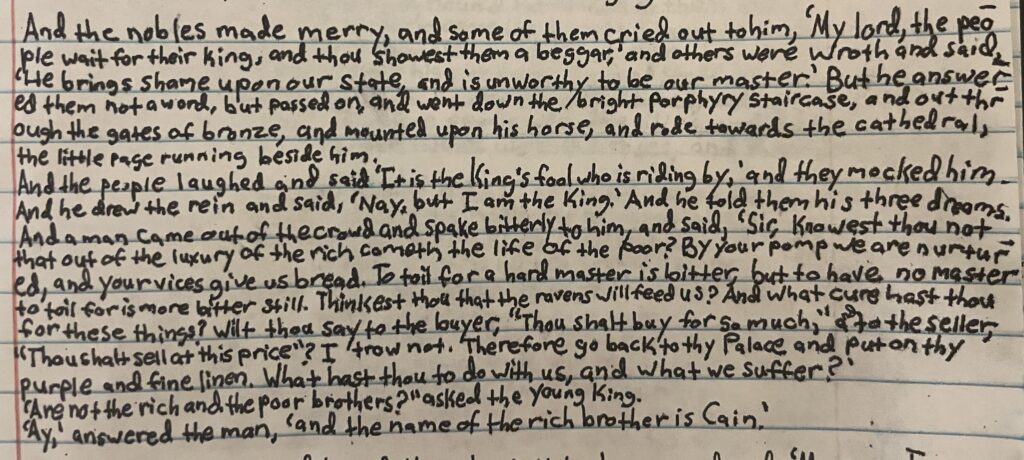
And the nobles made merry, and some of them cried out to him, ‘My lord, the people wait for their king, and thou showest them a beggar,’ and others were wroth and said, ‘He brings shame upon our state, and is unworthy to be our master.’ But he answered them not a word, but passed on, and went down the bright porphyry staircase, and out through the gates of bronze, and mounted upon his horse, and rode towards the cathedral, the little page running beside him.
And the people laughed and said, ‘It is the King’s fool who is riding by,’ and they mocked him. And he drew the rein and said, ‘Nay, but I am the King.’ And he told them his three dreams.
And a man came out of the crowd and spake bitterly to him, and said, ‘Sir, knowest thou not that out of the luxury of the rich cometh the life of the poor? By your pomp we are nurtured, and your vices give us bread. To toil for a hard master is bitter, but to have no master to toil for is more bitter still. Thinkest thou that the ravens will feed us? And what cure hast thou for these things? Wilt thou say to the buyer, “Thou shalt buy for so much,” and to the seller, “Thou shalt sell at this price”? I trow not. Therefore go back to thy Palace and put on thy purple and fine linen. What hast thou to do with us, and what we suffer?’
‘Are not the rich and poor brothers?’ asked the young King.
‘Ay,’ answered the man, ‘and the name of the rich brother is Cain.’
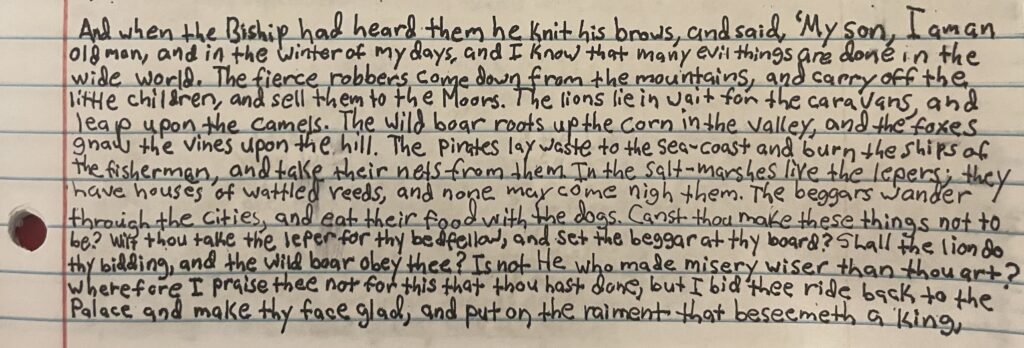

And when the Biship had heard them he knit his brows, and said, ‘My son, I am an old man, and in the winter of my days, and I know that many evil things are done in the wide world. The fierce robbers come down from the mountains, and carry off the little children and sell them to the Moors. The lions lie in wait for the caravans, and leap upon the camels. The wild boar roots up the corn in the valley, and the foxes gnaw the vines upon the hill. The pirates lay waste to the sea-coast and burn the ships of the fishermen, and take their nets from them. In the salt-marshes live the lepers; they have houses of wattled reeds, and none may come nigh them. The beggars wander through the cities, and eat their food with the dogs. Canst thou make these things not to be? Wilt thou take the leper for thy bedfellow, and set the beggar at thy board? Shall the lion do thy bidding, and the wild boar obey thee? Is not He who made misery wiser than thou art? Wherefore I praise thee not for this that thou hast done, but I bid thee ride back to the Palace and make thy face glad, and put on the raiment that beseemeth a king, and with the crown of gold I will crown thee, and the sceptre of pearl will I place in thy hand. And as for thy dreams, think no more of them. The burden of this world is too great for one man to bear, and the world’s sorrow too heavy for one heart to suffer.’
‘Sayest thou that in this house?’ said the young King, and he strode past the Biship, and climbed up the steps of the altar, and stood before the image of Christ.
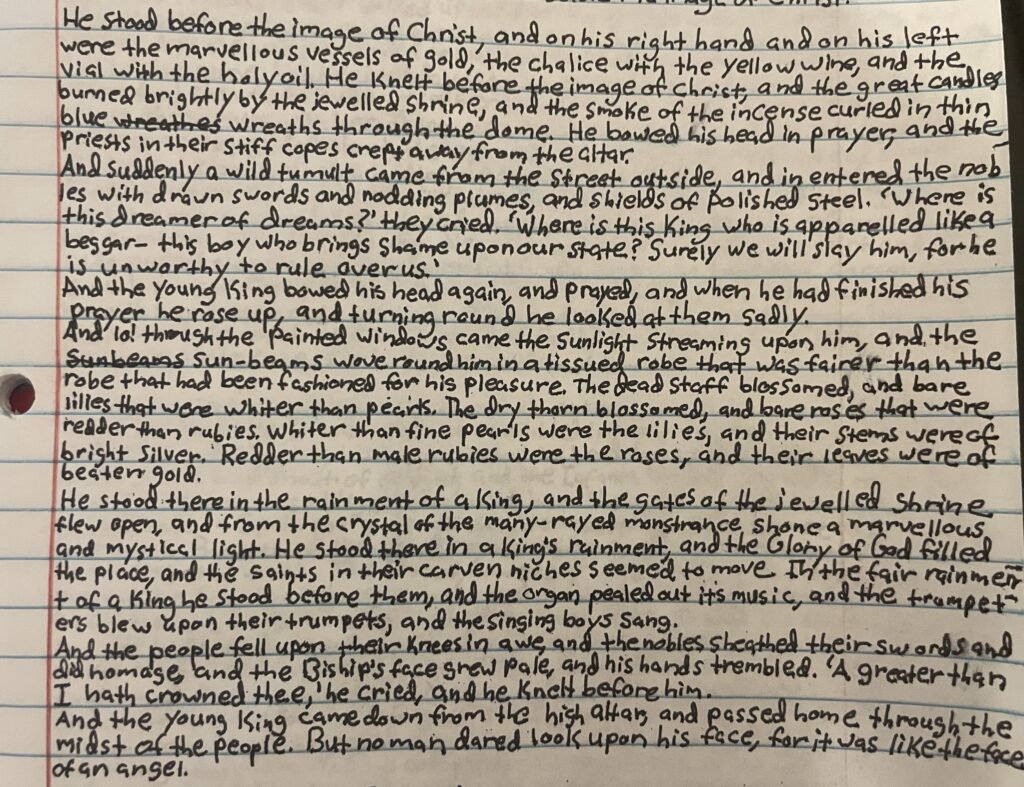
He stood before the image of Christ, and on his right hand and on his left were the marvellous vessels of gold, the chalice with the yellow wine, and the vial with the holy oil. He knelt before the image of Christ, and the great candles burned brightly by the jewelled shrine, and the smoke of the incense curled in thin blue wreaths through the dome. He bowed his head in prayer, and the priests in their stiff copes crept away from the altar.
And suddenly a wild tumult came from the street outside, and in entered the nobles with drawn swords and nodding plumes, and shields of polished steel. ‘Where is this dreamer of dreams?’ they cried. ‘Where is this King who is apparelled like a beggar – this boy who brings shame upon our state? Surely we will slay him, for he is unworthy to rule over us.’
And the young King bowed his head again, and prayed, and when he had finished his prayer he rose up, and turning round he looked at them sadly.
And lo! through the painted windows came the sunlight streaming upon him, and the sun-beams wove round him in a tissued robe that was fairer than the robe that had been fashioned for his pleasure. The dead staff blossomed, and bare lillies that were whiter than pearls. The dry thorn blossomed, and bare roses that were redder than rubies. Whiter than fine pearls were the lillies, and their stems were of bright silver. Redder than male rubies were the roses, and their leaves were of beaten gold.
He stood there in the rainment of a king, and the gates of the jewelled shrine flew open, and from the crystal of the many-rayed monstrance shone a marvellous and mystical light. He stood there in a king’s rainment, and the Glory of God filled the place, and the saints in their carven niches seemed to move. In the fair rainment of a king he stood before them, and the organ pealed out its music, and the trumpeters blew upon their trumpets, and the singing boys sang.
And the people fell upon their knees in awe, and the nobles sheathed their swords and did homage, and the Biship’s face grew pale, and his hands trembled. ‘A greater than I hath crowned thee,’ he cried, and he knelt before him.
And the young King came down from the high altar, and passed home through the midst of the people. But no man dared look upon his face, for it was like the face of an angel.



Although she was a real Princess and the Infanta of Spain, she had only one birthday every year, just like the children of quite poor people, so it was naturally a matter of great importance to the whole country that she should have a really fine day for the occasion. And a really fine day it certainly was. The tall striped tulips stood straight up upon their stalks, like long rows of soldiers, and looked defiantly across the grass at the roses, and said: ‘We are quite slendid as you are now,’ The purple butterflies fluttered about with gold dust on their wings, visiting each flower in turn; the little lizards crept out of the crevices of the wall, and lay basking in the white glare; and the pomegranates split and cracked with the heat and showed their bleeding red hearts. Even the pale yellow lemons, that hung in such profusion from the mouldering trellis and along the dim arcades seemed to have caught a richer color form the wonderful sunlight, and the magnolia trees opened their great globe like bossoms of folded ivory, and filled the air with a sweet heavy perfume.
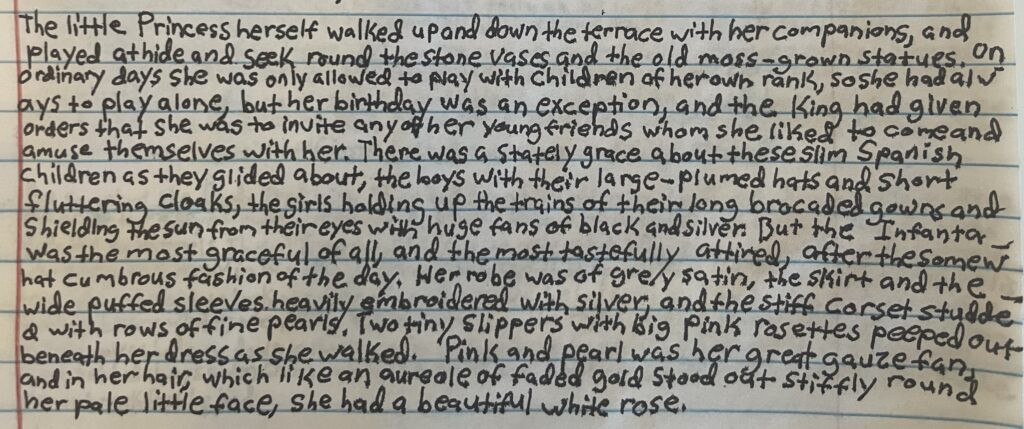
The little Princess herself walked up and down the terrace with her companions, and played at hide and seek round the stone vases and the old moss-grown statues. On ordinary days she was only allowed to play with children of her own rank, so she had always to play alone, but her birthday was an exception, and the King had given orders that she was to invite any of her young friends whom she liked to come and amuse themselves with her. There was a stately grace about these slim Spanish children as they glided about, the boys with their large-plumed hats and short fluttering cloaks, the girls holding up the trains of their long brocaded gowns and shielding the sun from their eyes with huge fans of black and silver. But the Infanta was the most graceful of all, and the most tastefully attired, after the somewhat cumbrous fashion of the day. Her robe was of grey satin, the skirt and wide puffed sleeves heavily embroidered with silver, and the stiff corset studded with rows of fine pearls. Two tiny slippers with big pink rosettes peeped out beneath her dress as she walked. Pink and pearl was her great gauze fan, and in her hair, which like an areole of faded gold stood out stiffly round her pale little face, she had a beautiful white rose.
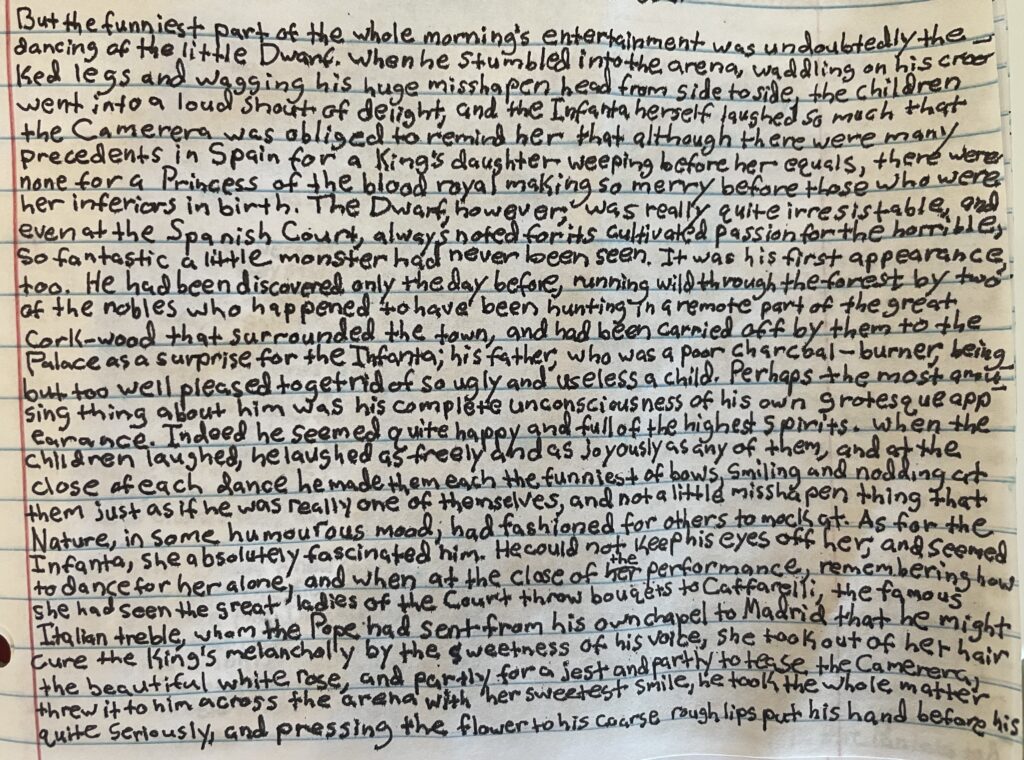

But the funniest part of the whole morning’s entertainment was undoubtly the dancing of the little Dwarf. When he stumbled into the arena, waddling on his crooked legs and wagging his huge misshapen head from side to side, the children went into a loud shout of delight, and the Infanta herself laughed so much that the Camerera was obliged to remind her that although there were many precedents in Spain for a King’s daughter weeping before her equals, there were none for a Princess of the blood royal making so merry before those who were her inferiors at birth. The Dwarf, however; was really quite irresistable, and so fantastic a little monster had never been seen. It was his first appearance too. He had been discovered only the day before, running wild through the forest, by two of the nobles who happened to have been hunting in a remote part of the great cork-wood that surounded the town, and had been carried off by them to the Palace as a surprise for the Infanta; his father, who was a poor charcoal-burner, being but too well pleased to get rid of so ugly and useless a child. Perhaps the most amusing thing about him was his complete unconsiousness of his own grotesque appearance. Indeed he seemed quite happy and full of the highest spirits. When the children laughed, he laughed as freely and as joyously as any of them, and at the close of each dance he made them each the funniest of bows, smiling and nodding at them just as if he was really one of themselves, and not a little misshapen thing that Nature, in some humourous mood, had fashioned for others to mock at. As for the Infanta, she absolutely fascinated him. He could not keep his eyes off her, and seemed to dance for her alone, and when at the close of the performance, remembering how she had seen the great ladies of the court throw bouqets to Caffarell: the famous Italian treble, whom the Pope had sent from his own chapel to Madrid that he might cure the king’s melancholly by the sweetness of his voice, she took out of her hair the beautiful white rose, and partly for a jest and partly to tease the Camarera threw it to him across the arena with her sweetest smile, he took the whole matter quite seriously, and pressing the flower to his course rough lips, put his hand before his heart, and sank on one knee before her, grinning from ear to ear, and with his little bright eyes sparkling with pleasure.

Even the red Geraniums, who did not usually give themselves airs, and were known to have a great many poor relations themselves, curled up in disgust when they saw him, and when the violets meekly remarked that though he was certainly extremely plain, still he could not help it, they retorted with a good deal of justice that that was his chief defect, and that there was no reason why one should admire a person because he was incurable; and, indeed, some of the violets themselves felt that the ugliness of the little Dwarf was almost ostentatious, and that he would have shown much better taste if he had looked sad, or at least pensive, instead of jumping about merrily, and throwing himself into such groteque and silly attitudes.

But somehow the Birds liked him. They had seen him often in the forest, dancing about like an elf after the eddying leaves, or crouched up in the hollow of some old oak-tree, sharing his nuts with the squirrels. They did not mind his being ugly, a bit. Why, even the nightingale herself who sang so sweetly in the orange groves at night that sometimes the Moon leaned down to listen, was not much to look at after all; and, besides, he had been kind to them, and during that terribly bitter winter, when there were no berries on the trees, and the ground was as hard as iron, and the wolves had come down to the very gates of the city to look for food, he had never once forgotten them, but had always given crumbs out of his little hunch of black bread, and divided with them whatever poor breakfast he had.

The Lizards also took an immense fancy to him, and when he grew tired of running about and flung himself down on the grass to rest, they played and romped all over him, and tried to amuse him in the best way they could. ‘Every one cannot be as beautiful as a lizard,’ they cried; ‘that would be too much to expect. And, though it sounds absurd to say so, he is really not so ugly after all, provided, of course, that one shuts one’s eyes, and does not look at him.’ The Lizards were extremely philosophical by nature, and often sat thinking for hours and horus together, when there was nothing else to do, or when the weather was too rainy for them to go out.

The Flowers, however, were excessively annoyed at their behavior, and at the behavior of the birds. ‘It only shows,’ they said, ‘What a vulgarising effect this encessant rushing and flying about has. Well-bred people always stay exactly in the same place, as we do. No one ever saw us hopping up and down the walks, or galloping madly through the grass after dragon-flies. When we do want change of air, we send for the gardener; and he carries us to another bed. This is dignified, and as it should be. But birds and lizards have no sense of repose, and indeed birds have not even a permanent address. They are mere vagrants like the gipsies, and should be treated in exactly the same manner.’ So they put their noses in the air, and looked very haughty, and were quite delighted when after some time they saw the little Dwarf scramble up from the grass, and make his way across the terrace to the palace.
‘He should certainly be kept indoors for the rest of his natural life,’ they said. ‘Look at his hunched back, and his crooked legs,’ and they began to titter.

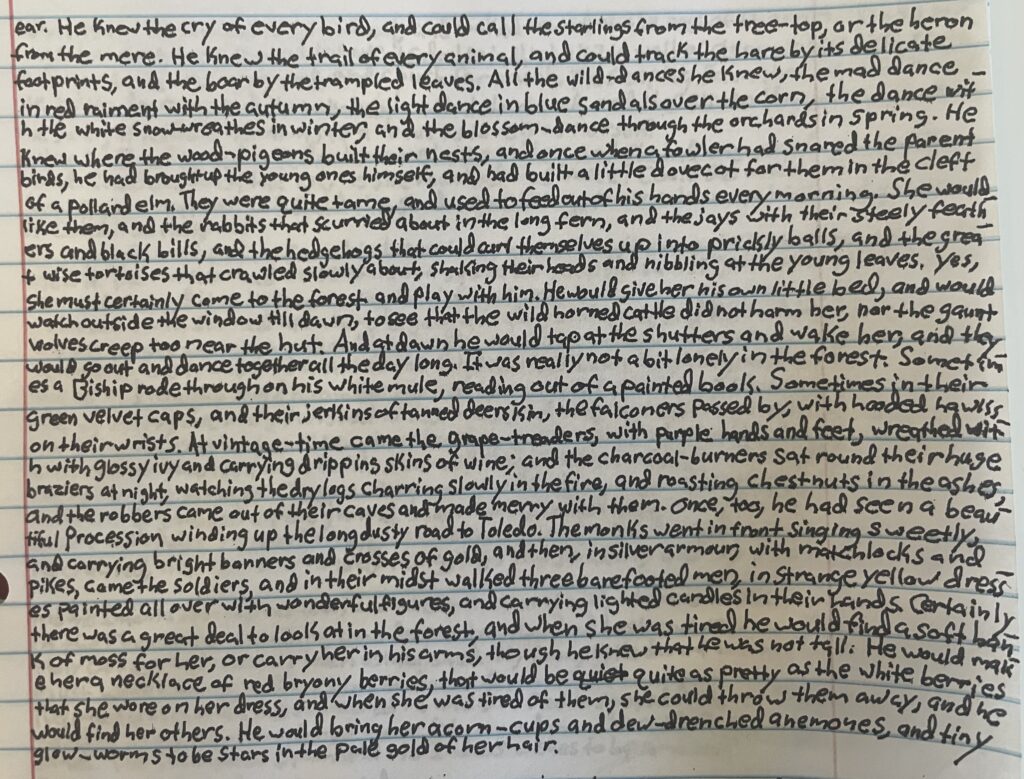
But the little Dwarf knew nothing of all this. He liked the birds and the lizards immensely and thought that the flowers were the most marvellous thing in the whole world, except of course the Infanta; but then she had given him the beautiful white rose, and she loved him, and that made a great difference. How he wished that he had gone back with her! She would have put him on her right hand, and smiled at him, and he would have never left her side, but would have made her his playmate, and taught her all kinds of delightful tricks. For though he had never been in a palace before, he knew a great many wonderful things. He could make little cages out of rushes for grasshoppers to sing in, and fashion the long jointed bamboo into the pipe that Pan loves to hear. He knew the cry of every bird, and could call the starlings from the tree-top, or the heron from the mere. He knew the trail of every animal, and could track the hare by its delicate footprints, and the boar by the trampled leaves. All the wild-dances he knew, the mad dance in red raiment with the autumn, the light dance in blue sandals over the corn, the dance with the white snow-wreathes in winter, and the blossom-dance through the orchards in spring. He knew where the wood-pigeons built their nests, and once when a fowler had snared the parent birds, he had brought up the young ones himself, and had built a little dovecot for them in the cleft of a pollard elm. They were quite tame, and used to feed out of his hands every morning. She would like them, and the rabbits that scurried about in the long fern, and the jays with their steely feathers and black bills, and the hedgehogs that could curl themselves up into prickly balls, and the great wise tortoises that crawled slowly about, shaking their heads and nibbling at the young leaves. Yes, she must certainly come to the forest and play with him. He would give her his own little bed, and would watch outside the window till dawn to see that the wild horned cattle did not harm her, nor the gaunt wolves creep too near the hut. And at dawn he would tap at the shutters and wake her, and they would go out and dance together all the day long. It was really not a bit lonely in the forest. Sometimes a Biship rode through on his white mule, reading out of a painted book. Sometimes in their green velvet caps, and their jerkins of tanned deerskin, the falconers passed by, with hooded hawks on their wrists. At vintage-time came the grape-treaders, with purple hands and feet, wreathed with glossy ivy and carrying dripping skins of wine; and the charcoal-burners sat round their huge braziers at night, watching the dry logs charring slowly in the fire, and roasting chestnuts in the ashes, and the robbers came out of their caves and made merry with them. Once, too, he had seen a beautiful procession winding up the long dusty road to Toledo. The monks went in front singing sweetly, and carrying bright banners and crosses of gold, and then, in silver armour, with matchlocks and pikes, came the soldiers, and in their midst walked three barefooted men, in strange yellow dresses painted all over with wonderful figures, and carrying lighted candles in their hands. Certainly there was a great deal to look at in the forest, and when she was tired he would find a soft bank of moss for her, or carry her in his arms, though he knew that he was not tall. He would make her a necklace of red bryony berries, that would be quite as pretty as the white berries that she wore on her dress, and when she was tired of them, she would throw them away, and he would find her others. He would bring her acorn-cups and dew-drenched anemones, and tiny glow-worms to be stars in the pale gold of her hair.
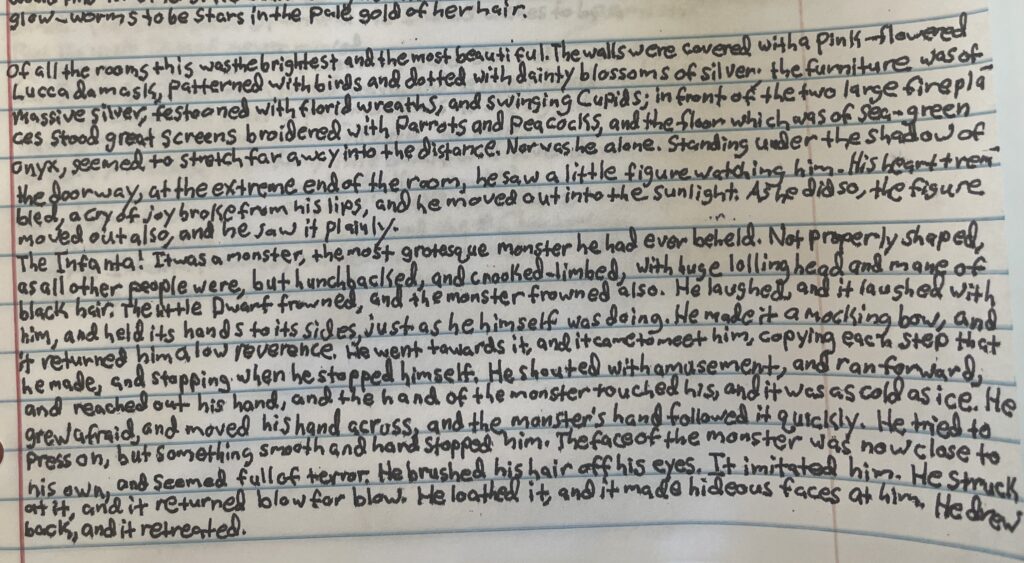
Of all the rooms this was the brightest and the most beautiful. The walls were covered with a pink-flowered Lucca damask, patterned with birds and dotted with dainty blossoms of silver; the furniture was of massive silver, festooned with florid wreaths, and swinging Cupids; in front of the two large fireplaces stood great screens broidered with Parrots and Peakcocks, and the floor which was of sea-green onyx, seemed to stretch far away into the distance. Nor was he alone. Standing under the shadow of the doorway, at the extreme end of the room, he saw a little figure watching him. His heart trembled, a cry of joy broke from his lips, and he moved out into the sunlight. As he did so, the figure moved out also, and he saw it plainly.
The Infanta! It was a monster, the most grotesque monster he had ever beheld. Not properly shaped as all other people were, but hunchbacked, and crooked-limbed, with huge lolling head and mane of black hair. The little Dwarf frowned, and the monster frowned also. He laughed, and it laughed with him, and held its hands to its sides, just as he himself was doing. He made it a mocking bow, and it returned him a low reverence. He went towards it, and it came to meet him, copying each step that he made, and stopping when he stopped himself. He shouted with amusement, and ran forward, and reached out his hand, and the hand of the monster touched his, and it was as cold as ice. He grew afraid, and moved his hand across, and the monster’s hand followed it quickly. He tried to press on, but something smooth and hard stopped him. The face of the monster was now close to his own, and seemed full of terror. He brushed his hair off his eyes. It imitated him. He struck at it, and it returned blow for blow. He loathed it, and it made hideous faces at him. He drew back, and it retreated.
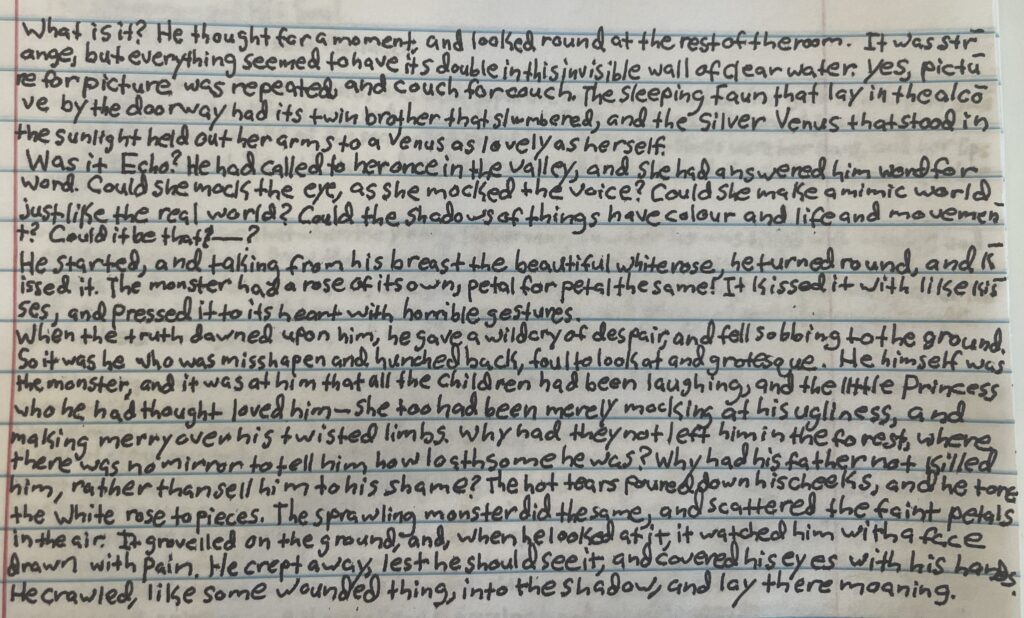
What is it? He thought for a moment, and looked round at the rest of the room. It was strange, but everything seemed to have its double in this invisible wall of clear water. Yes, picture for picture was repeated, and couch for couch. The sleeping Faun that lay in the alcove by the doorway had its twin brother that slumbered, and the silver Venus that stood in the sunlight held out her arms to a Venus as lovely as herself.
Was it Echo? He had called to her once in the valley, and she had answered him word for word. Could she mock the eye, as she mocked the voice? Could she make a mimic world just like the real world? Could the shadows of things have colour and life and movement? Could it be that -?
He started, and taking from his breast the beautiful white rose, he turned round, and kissed it. The monster had a rose of its own, petal for petal the same! It kissed it with like kisses, and pressed it to its heart with horrible gestures.
When the truth dawned upon him, he gave a wild cry of despair, and fell sobbing to the ground. So it was he who was misshapen and hunched back, foul to look at and grotesque. He himself was the monster, and it was at him that all the children had been laughing, and the little princess who he had thought loved him – she too had been merely mocking at his ugliness, and making merry over his twisted limbs. Why had they not left him in the forest, where there was no mirror to tell him how loathsome he was? Why had his father not killed him, rather than sell him to his shame? The hot tears poured down his cheeks, and he tore the white rose to pieces. The sprawling monster did the same, and scattered the faint petals in the air. It grovelled on the ground, and, when he looked at it, it watched him with a face drawn with pain. He crept away, lest he should see it, and covered his eyes with his hands. He crawled, like some wounded thing, into the shadow, and lay there moaning.
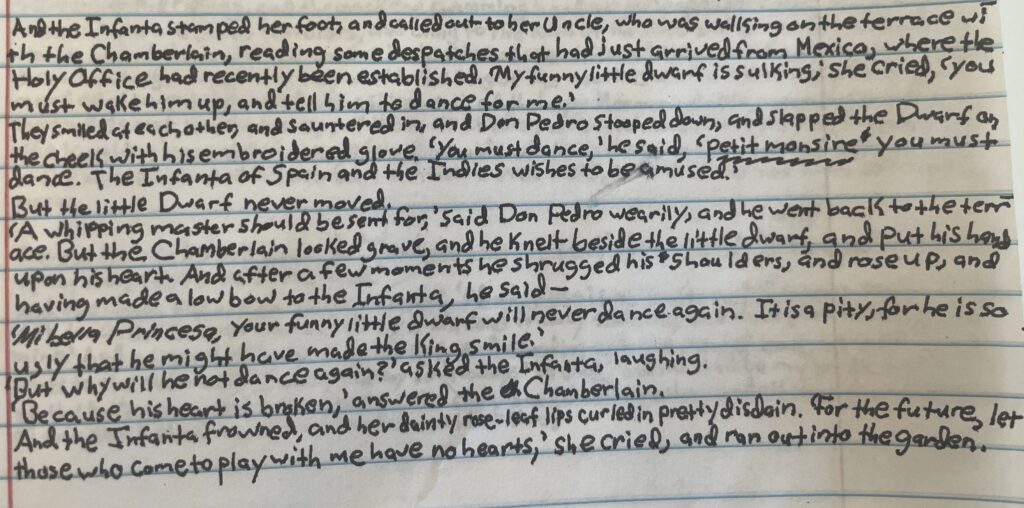
And the Infanta stamped her foot, and called out to her uncle, who was walking on the terrace with the Chamberlain, reading some despatches that had just arrived from Mexico, where the Holy Office had recently been established. ‘My funny little dwarf is sulking,’ she cried, ‘you must wake him up, and tell him to dance for me.’
They smiled at each other, and sauntered in, and Don Pedro stooped down, and slapped the Dwarf on the cheek with his embroidered glove. ‘You must dance,’ he said. ‘Petit monsire you must dance. The Infanta of Spain and the Indies wishes to be amused.
But the little Dwarf never moved.
‘A whipping master should be sent for,’ said Don Pedro wearily, and went back to the terrace. But the Chamberlain looked grave, and he knelt beside the little dwarf, and put his hand upon his heart. And after a few moments he shrugged his shoulders, and rose up, and having made a low bow to the Infanta, he said –
‘Mi bella Princesa, your funny little dwarf will never dance again. It is a pity, for he is so ugly that he might have made the King smile.’
‘But why will he not dance again?’ asked the Infanta, laughing.
‘Because his heart is broken,’ answered the Chamberlain.
And the Infanta frowned, and her dainty rose-leaf lips curled in pretty disdain. ‘For the future, let those who come to play with me have no hearts,’ she cried, and ran out into the garden.

Summary
A fisherman willingly parts with his Soul to be with a mermaid. His Soul is a useless abstraction with no bearing on the real or material world. It travels the earth, and gains many experiences in exotic locations and cities. But being abandoned and parted from the body, the Soul completes its travel with no heart nor love.

Her hair was as a wet fleece of gold, and each separate hair as a thread of fine gold in a cup of glass. Her body was as white ivory, and her tail was of silver and pearl. Silver and pearl was her tail, and the green weeds of the sea coiled round it; and like sea-shells were her ears, and her lips were like sea-coral. The cold waves dashed over her cold breasts, and the salt glistened upon her eyelids.

So beautiful was she that when the young Fisherman saw her he was filled with wonder, and he put out his hand and drew the net close to him, and leaning over the side he clasped her in his arms. And when he touched her, she gave a cry like a startled sea-gull, and woke, and looked at him in terror with her mauve-amethyst eyes, and struggled that she might escape. But he held her tightly to him, and would suffer her to depart.
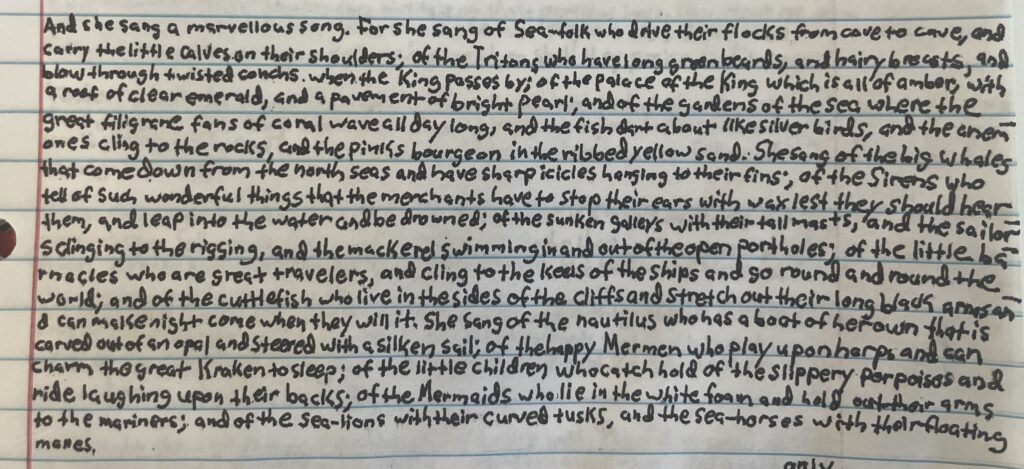
And she sang a marvellous song. For she sang of Sea-folk who drive their flocks from cave to cave, and carry the little calves on their shoulders; of the Tritons who have long green beards, and hairy breasts, and blow through twisted conchs. When the King passes by; of the palace of the King which is all of amber, with a roof of clear emerald, and a pavement of bright pearl; and of the gardens of the sea where the great filigrane fans of coral wave all day long, and the fish dart about like silver birds, and the anemones cling to the rocks, and the pinks bourgeon in the ribbed yellow sand. She sang of the big whales that come down from the north seas and have sharp icicles hanging to their fins; of the Sirens who tell of such wonderful things that the merchants have to stop their ears with wax lest they should har them, and leap into the water and be drowned; of the sunken galleys with their tall masts, and the sailors clinging to the rigging, and the mackeral swimming in and out of the open portholes; of the little barnacles who are great travelers, and cling to the keels of the ships and go round and round the world; and of the cuttlefish who live in the sides of the cliffs and stretch out their long black arms and can make night come when they will it. She sang of the nautilus who has a boat of her own that is carved out of an opal and steered with a silken sail; of the Mermaids who lie in the white foam and hold out their arms to the mariners; and of the sea-lions with their curved tusks, and the sea-horses with their floating manes.

But the Mermaid shook her head. ‘Thou hast a human soul,’ she answered. ‘If only thou wouldst send away thy soul, then could I love thee.’
And the young Fisherman said to himself, ‘Of what use is my soul to me? I cannot see it. I may not touch it. I do not know it. Surely I will send it away from me, and much gladness shall be mine.’ And a cry of joy broke from his lips, and standing up in the painted boat, he held out his arms to the Mermaid. ‘I will send my soul away,’ he cried, ‘and you shall be my bride, and I will be thy bridegroom, and in the depth of the sea we will dwell together; and all that thou hast sung thou shalt show me, and all that thou desirest I will do, nor shall our lives be divided.
And the little Mermaid laughed for pleasure and hid her face in her hands.

‘The love of the body is vile,’ cried the Priest, knitting his brows, ‘and vile and evil are the pagan things God suffers to wander through His world. Accursed be the Fauns of the woodland, and accursed be the singers of the sea! I have heard them at night-time, and they have sought to lure me from my beads. They tap at the window and laugh. They whisper in my ears the tale of their perilous joys. They tempt me with tempations and when I would pray they make mouths at me. They are lost, I tell thee, they are lost. For them there is no heaven nor hell, and in neither shall they praise God’s name.’

‘Father,’ cried the young Fisherman, ‘thou knowest not what thou sayest. Once in my net I snared the daughter of a King. She is fairer than the morning star, and whiter than the moon. For her body I would give my soul, and for her love I would surrender heaven. Tell me what I ask of thee, and let me go in peace.’

But the merchants mocked at him, and said, ‘Of what use is a man’s soul to us? It is not worth a clipped piece of silver. Sell us thy body for a slave, and we will clothe thee in sea-purple, and put a ring upon thy finger, and make thee the minion of the great Queen. But talk not of the soul, for to us it is nought, nor has it any value for our service.’
And the young Fisherman said to himself: ‘How strange a thing this is! The Priest telleth me that the soul is worth all the gold in the world, and the merchants say that it is not worth a clipped piece of silver.’ And he passed out of the market-place, and went down to the shore of the sea and began to ponder on what he should do.
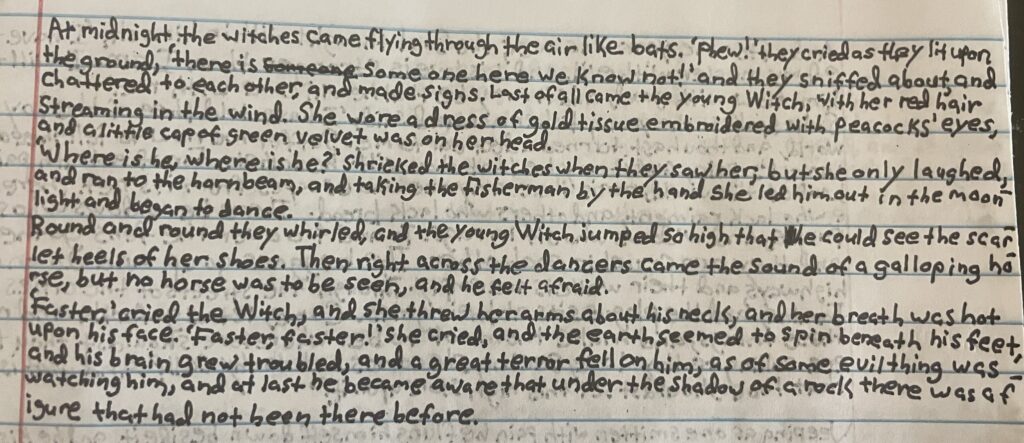
At midnight the witches came flying through the air like bats. ‘Phew!’ they cried as they lit upon the ground, ‘there is some one here we know not!’ and they sniffed about, and chattered to each other, and made signs. Last of all came the young Witch, with her red hair streaming in the wind. She wore a dress of gold tissue embroidered with peacocks’ eyes, and little cap of green velvet was on her head.
‘Where is he, where is he?’ shrieked the witches when they saw her; but she only laughed and ran to the hornbeam, and taking the Fisherman by the hand she led him out in the moonlight and began to dance.
Round and round they whirled, and the young Witch jumped so high that he could see the scarlet heels of her shoes. Then right across the dancers came the sound of a galloping horse, but no horse was to be seen, and he felt afraid.
‘Faster,’ cried the Witch, and she threw her arms about his neck, and her breath was hot upon his face. ‘Faster, faster!’ she cried, and the earth seemed to spin beneath his feet, and his brain grew troubled, and a great terror fell on him, as of some evil thing was watching him, and at last he became aware that under the shadow of a rock there was a figure that had not been there before.

It was a man dressed in a suit of black velvet, cut in the Spanish fashion. His face was a strangely pale, but his lips were like a proud red flower. He seemed weary, and was leaning back toying in a listless manner with the pommel of his dagger. On the grass beside him lay a plumed hat, and a pair of riding-gloves gauntleted with gilt lace, and sewn with seed-pearls wrought into a curious device. A short cloak lined with sables hang from his shoulder, and his delicate white hands were gemmed with rings. Heavy eyelids drooped over his eyes.

She was silent for a few moments, and a look of terror came over her face. Then she brushed her hair back from her forehead, and smiling strangely she said to him, ‘What men call the shadow of the body is not the shadow of the body, but the body of the soul. Stand on the sea-shore with thy back to the moon, and cut away from around thy feet thy shadow, which is thy soul’s body, and bid thy soul leave thee, and it will do so.’

‘Thou couldst not believe how marvellous a place it was. There were huge tortoise-shells full of pearls, and hollowed moonstones of great size piled up with red rubies. The gold was stored in coffers of elephant hide, and the gold-dust in leather bottles. There were opals and sapphires, the former in cups of crystal, and the latter in cups of jade. Round green emeralds were ranged in order upon thin plates of ivory, and in one corner were silk bags filled, some with turquoise stones, others with veryls. The ivory horns were heaped with purple amethysts, and the horns of brass with chalcadonies and sards. The pillars, which were of cedar, were hung with strings of yellow lynx-stones. In the flat oval shields there were carbuncles both wine-coloured and coloured like grass. And yet I have told thee but a tithe of what was there.

‘Thou knowest,’ answered his Soul, ‘thou knowest it well. Hast thou forgotten that thou gavest me no heart? I trow not. And so trouble not thyself nor me, but be at peace, for there is no pain that thou shalt not give away, nor any pleasure that thou shalt not recieve.

Yet his Soul stirred not from him, nor paid heed to his command, but said to him, ‘that spell that the Witch told thee avails thee no more, for I may not leave thee, nor mayest thou drive me forth. Once in this life may a man send his Soul away, but he who recievest back his Soul must keep it with him forever, and this is his punishment and his reward.’
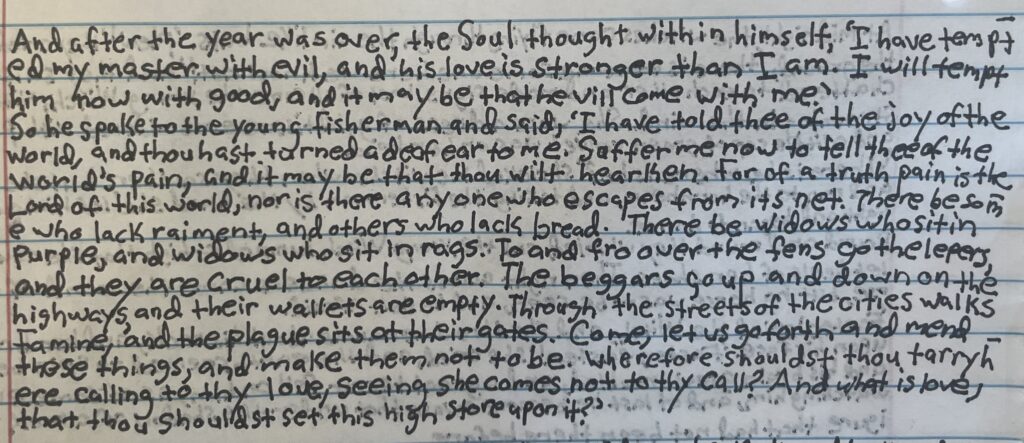
And after the year was over, the Soul thought within himself, ‘I have tempted my master with evil, and his love is stronger than I am. I will tempt him now with good, and it may be that he will come with me.’
So he spake to the young Fisherman and said, ‘I have told thee of the joy of the world, and thou hast turned a deaf ear to me. Suffer me now to tell thee of the world’s pain, and it may be that thou wilt hearken. For of a truth pain is the Lord of this world, nor is there any one who escapes from its net. There be some who lack raiment, and others who lack bread. There be widows who sit in purple, and widows who sit in rags. To and fro over the fens go the lepers, and they are cruel to each other. The beggars go up and down on the highways, and their wallets are empty. Through the streets of the cities walks Famine, and the plague sits at their gates. Come, let us go forth and mend these things, and make them not to be. Wherefore shouldst thou tarry here calling to thy love, seeing she comes not to thy call? And what is love that thou shouldst set this high store upon it?’

Weeping as one smitten with pain he flung himself down beside it, and he kissed cold red of the mouth, and toyed with the wet amber of the hair. He flung himself down beside it on the sand, weeping as one trembling with joy and in his brown arms, he held it to his breast. Cold were the lips, yet he kissed them. Salt was the honey of the hair, yet he tasted it with a bitter joy. He kissed the closed eyelids, and the wild spray that lay upon their cups was less salt than his tears.
And to the dead thing he made confession. Into the shells of its ears he poured the harsh wine of his tale. He put the little hands round his neck and with his fingers he touched the thin reed of the throat. Bitter, bitter was his joy, and full of strange gladness was his pain.
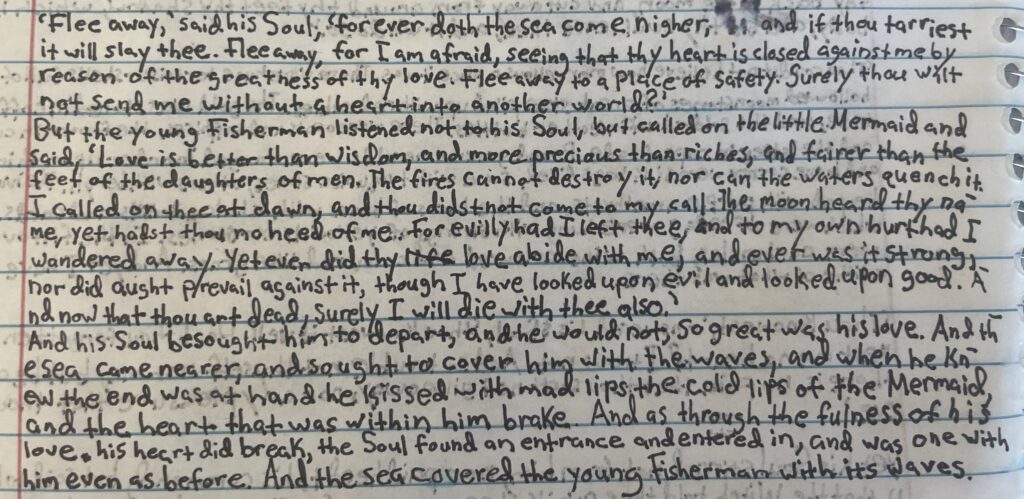
‘Flee away,’ said his Soul, ‘for ever doth the sea come nigher, and if thou tarriest it will slay thee. Flee away, for I am afraid, seeing that thy heart is closed against me by reason of the greatness of thy love. Flee away to a place of safety. Surely thou wilt not send me without a heart into another world?’
But the young Fisherman listened not to his Soul, but called on the little Mermaid and said, ‘Love is better than wisdom, and more precious than riches, and fairer than the feet of the daughters of men. The fires cannot destroy it, nor can the waters quench it. I called on thee at dawn, and thou didst not come to my call. The moon heard thy name, yet hadst thou no heed of me. For evily had I left thee, and to my own hurt had I wandered away. Yet ever did thy love abide with me, and ever was it strong, nor did aught prevail against it, though I have looked upon evil and looked upon good. And now that thou art dead, surely I will die with thee also.’
And his Soul besought him to depart, and he would not, so great was his love. And the sea, came nearer, and sought to cover him with the waves, and when he knew the end was at hand he kissed with mad lips the cold lips of the Mermaid and the heart that was within him brake. And as through the fulness of his love his heart did break, the Soul found an entrance and entered in, and was one with him even as before. And the sea covered the young Fisherman with its waves.

And when he [the Priest] had robed himself with his robes, and entered in and bowed himself before the altar, he saw that the altar was covered with strange flowers that never had been seen before. Strange were they to look at, and of curious beauty, and their beauty troubled him, and their odour was sweet in his nostrils. And he felt glad, and understood not why he was glad.

And in the morning, while it was still dawn, he [the Priest] went forth with the monks and the musicians and the candle-bearers and the swingers of censers, and a great company, and came to the shore of the sea, and blessed the sea, and all the wild things that are in it. The fauns also he blessed, and the little things that dance in the wood-land, and the bright eyed things that peer through the leaves. All the things in God’s world he blessed, and the people were filled with joy and wonder. Yet never again in the corner of the Fuller’s Field grew flowers of any kind, but the field remained barren even as before. Nor came the Sea-folk into the bay as they had been wont to do, for they went to another part of the sea.
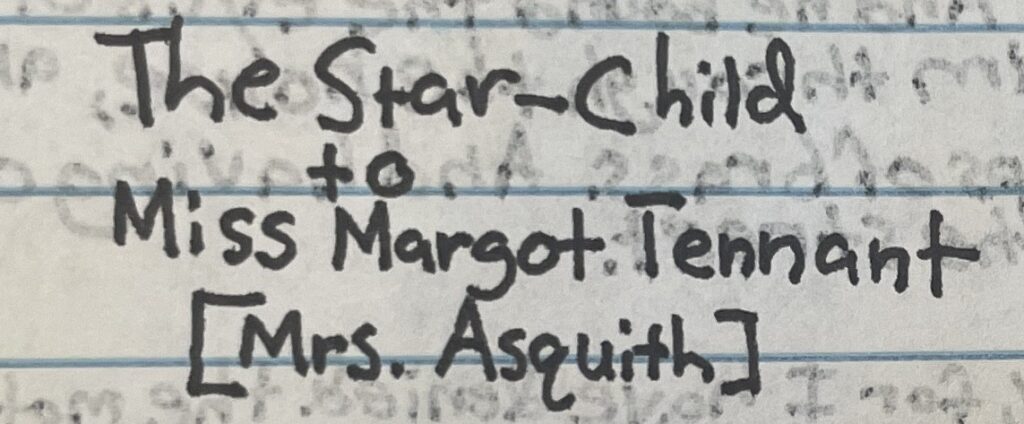

And after a time she turned round and looked at him, and her eyes were full of tears. And he came in swiftly, and placed the child in her arms, and she kissed it, and laid it in a little bed where the youngest of their own children was lying. And on the morrow the Woodcutter took the curious cloak of gold and placed it in a great chest, and a chain of amber that was round the child’s neck his wife took and set it in the chest also.

Yet did his beauty work him evil. For he grew proud, and cruel, and selfish. The children of the Woodcutter, and the other children of the village, he despised, saying they were of mean parentage, while he was noble, being sprang from a Star, and he made himself master over them, and called them his servants. No pity had he for the poor, or for those who were blind or maimed or in any way afflicted, but would cast stones at them and drive them forth on to the highway, and bid them beg their bread elsewhere, so that none save the outlaws came twice to that village to ask for alms. Indeed, he was as one enamoured of beauty, and would mock at the weakly and ill-favoured, and make jest of them; and himself he loved, and in summer, when the winds were still, he would lie by the well in the priest’s orchard and look down at the marvel of his own face, and laugh for the pleasure he had in his fairness.

He said to the Mole, ‘Thou canst go beneath the earth. Tell me, is my mother there?’
And the Mole answered, ‘Thou hast blinded mine eyes. How should I know?
He said to the Linnet, ‘Thou canst fly over the tops of tall trees, and canst see the whole world. Tell me, canst thou see my mother?’
And the Linnet answered, ‘Thou hast clipt my wings for thy pleasure. How should I fly?’
And to the little Squirrel who lived in the fir-tree, and was lonely, he said, ‘Where is my mother?’
And the Squirrel answered, ‘Thou hast slain mine. Dost thou seek to slay thine also?’

And when he passed through the villages the children mocked him, and threw stones at him, and the carlots would not suffer him even to sleep in the byres lest he might bring mildew on the stored corn, so foul was he to look at, and their hired men drave him away, and there was none who had pity on him. Nor could he hear anywhere of the beggar-woman who was his mother, though for the space of three years he wandered over the world, and often seemed to see her on the road in front of him, and would call to her, and run after her till the sharp flints made his feet bleed. But overtake her he could not, and those who dwelt by the way did ever deny that they had seen her, or any like her, and they made sport of his sorrow.
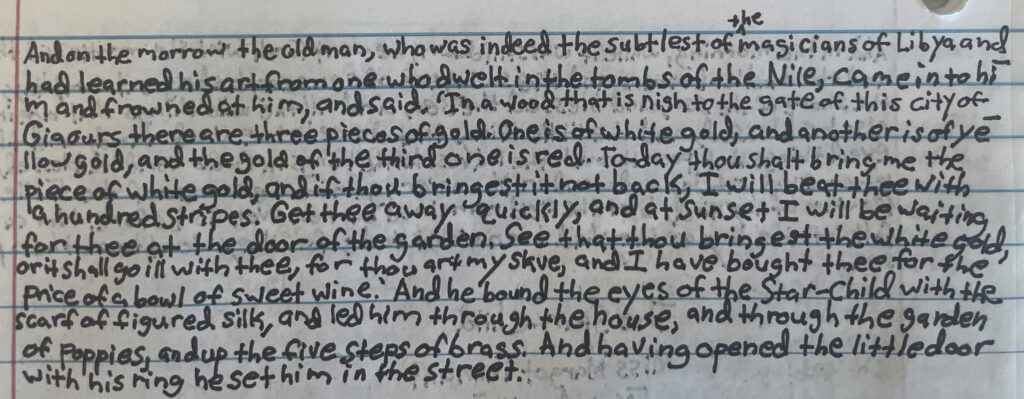
And on the morrow the old man, who was indeed the subtlest of the magicians of Libya and had learned his art from one who dwelt in the tombs of the Nile, came in to him and frowned at him, and said, ‘In a wood that is nigh to the gate of this city of Giaours there are three pieces of gold. One is of white gold, and another is of yellow gold, and the gold of the third one is red. To-day thou shalt bring me the piece of white gold, and if thou bringest it not back, I will beat thee with a hundred stripes. Get thee away quickly, and at Sunset I will be waiting for thee at the door of the garden. See that thou bringest the white gold, or it shall go ill with thee, for thou art my slave, and I have bought thee for the price of a bowl of sweet wine.’ And he bound the eyes of the Star-Child with the scarf of figured silk, and led him through the house, and through the garden of poppies, and up the five steps of brass. And having opened the little door with his ring he set him in the street.

But he said to them, ‘I am not worthy, for I have denied the mother who bare me, nor may I rest till I have found her, and known her forgiveness. Therefore, let me go, for I must wander again over the world, and may tarry here, though ye bring me the crown and the sceptre.’ And as he spake he turned his face from them towards the street that led to the gate of the city, and lo! amongst the crowd that pressed round the soldiers; he saw the beggar-woman that was his mother, and at her side stood the leper, who sat by the road.
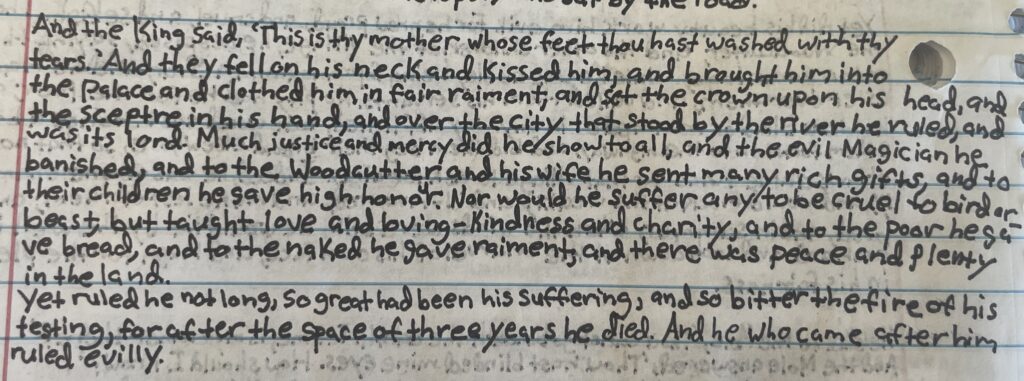
And the King said, ‘This is thy mother whose feet thou hast washed with thy tears.’ And they fell on his neck and kissed him, and brought him into the palace and clothed him in fair rament, and set the crown upon his head, and the sceptre in his hand, and over the city that stood by the river he ruled, and was its lord. Much justice and mercy did he show to all, and the evil Magician he banished, and to the Woodcutter and his wife he sent many rich gifts, and to their children he gave high honor. Nor would he suffer any to be cruel to bird or beast, but taught love and loving-kindness and charity, and to the poor he gave bread, and to the naked he gave raiment, and there was peace and plenty in the land.
Yet ruled he not long, so great had been his suffering, and so bitter the fire of his testing, for after the space of three years he died. And he who came after him ruled evilly.
